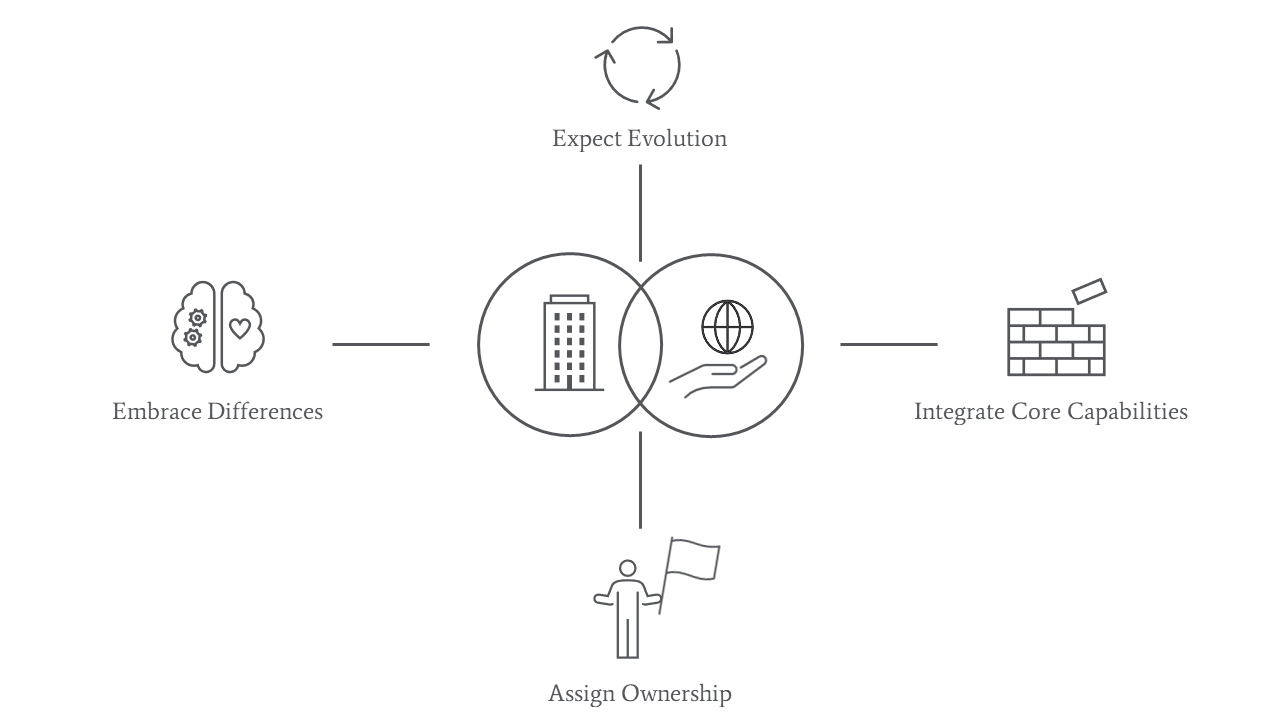A long-term alliance shows how businesses can partner with NGOs to improve social impact and find new market opportunities
Dr. Jonathan Doh is a world expert on corporate and non-profit partnerships. He is Professor of Management and Operations at the Villanova School of Business.
Businesses can improve their social and environmental performance and find new market opportunities through partnerships with non-governmental organizations (NGOs). The knowledge, expertise and capabilities of NGOs and corporations are different and may be complementary. Together, NGOs and companies can often accomplish more than they could alone. But misunderstandings and other obstacles can prevent partnerships from reaching their potential.
Read on for key lessons for companies wanting to engage with NGOs, illustrated using the example of a partnership between Swiss Re and Oxfam.
Swiss Re and Oxfam: Achieving Results
Swiss Re, a leading global insurance company, was approached in 2007 by international development NGO Oxfam. Oxfam wanted Ethiopian farmers to have insurance against risks to their crops from climate change. No such insurance product was available and Swiss Re had the expertise necessary to develop it.
Swiss Re, too, saw potential benefits in the collaboration. Swiss Re’s experience was primarily in wealthy countries, but it was interested in expanding its market to developing countries and had a strong organizational commitment to addressing climate change. Swiss Re valued Oxfam’s long-time presence in Ethiopia and its deep understanding of the country’s environment and culture.
In both organizations, the partnership had to overcome internal resistance. The project was novel and working with an organization from a different sector was unusual.
At Oxfam, the project leader recalled, “Several influential and powerful colleagues speculated with open hostility about what Swiss Re’s real motives must be.” Strong leadership allowed the project to go forward. The project champion was respected by other employees and the project had backing from executive leadership.
At Swiss Re, the project had strong champions who involved both business and philanthropic units, linking the project clearly to business strategy.
The two organizations began by working on a pilot project in one village in Ethiopia. They gradually developed confidence in each other and their approach to the issue, and continually explored ways that the collaboration could best suit the two organizations’ needs.
A 2010 discussion between Oxfam and Swiss Re leaders on how the project connected to food security, another priority issue for Swiss Re, was “the moment that the light went on” and opportunities for expansion became clear. Five years after beginning their collaboration, Swiss Re and Oxfam were working on projects in Ethiopia and three other countries in West Africa.
4 Key Lessons for Partnership Success
The Swiss Re–Oxfam story highlights several key issues that influence whether collaborations succeed. We’ve seen these themes in multiple studies of corporate-NGOs partnerships, including large-scale surveys, case studies and personal interviews. They’re important whether your business is working on a project at home or abroad.

4 Tips for Successful NGO-Corporate Partnership – Graphic created by Abby Litchfield
Embrace difference – carefully. Recognize and value the differences between your company and the NGO. After all, without those differences, there would be no reason to collaborate. Alternative perspectives can make collaboration uncomfortable at times, but provide value as each side’s knowledge, expertise and capabilities complement the other’s.
Hiring strategy can help organizations better understand these differences. Increasingly, companies employ NGO veterans to help guide their interactions with nonprofits, and NGOs look to the private sector for managers who can help them navigate their relationships with companies.
At the same time, think strategically about whether you are choosing the right partner – just as you would with a business partnership. What does each side bring to the table? Especially with a significant partnership, is there a foundation for trust? Trust relies on shared culture or complementary missions and respect for the partner’s potential contribution. Swiss Re’s project leader recalls his first, positive, impression of Oxfam: “We had a feeling that Oxfam really knew what they were doing.”
Assign a champion and give them authority and decision-making ability. Because partnerships represent a new approach, a powerful champion is needed to overcome inertia and get things done. NGOs also want to see that the company is taking the relationship seriously.
Make NGO engagement part of the core business. Partnerships should gradually be integrated into the responsibilities of business units and functions, rather than being maintained as a stand-alone enterprise. Partnerships are most successful when each participant leverages its core capabilities and contributes resources based on normal operations.
Plan for the relationship to evolve over time. External conditions, interests and positions will change. These changes can sometimes mean that the partnership has run its course. That’s okay too. Just be prepared for and responsive to these changes. Regular meetings with both parties to assess the partnership’s usefulness and prospects can build reflection into the process. You can also build this evolution into the initial agreement or Memorandum of Understanding, so that both sides expect that the relationship will require reassessment.
Corporate-NGO partnerships are complex and challenging. But they can benefit both the corporate and NGO participants. To give new partnerships the best chance of succeeding, approach relationships carefully, structure them thoughtfully, and seek ongoing recalibration as they evolve. The Oxfam – Swiss Re partnership reflects the power and possibilities of such collaboration, but also the real challenges to realizing these benefits.
A Partnership from 2007 to 2012…to 2020
I wrote the original version of this article in 2012. Here’s what has happened since.
Cross-sectoral collaborations have continued to flourish and spread, and the Swiss Re/Oxfam effort has deepened and broadened. It has been rebranded the R4 Rural Resilience Initiative and added several governmental, nongovernmental and private partners. As of 2019, it reached over 87,000 farmers, or about 450,000 people including families, in Ethiopia, Kenya, Malawi, Senegal, Zambia and Zimbabwe. The program helps them manage risk related to weather issues through diverse strategies, including insurance. In 2018 alone, about US$ 1.5 million of insurance payouts were distributed through the initiative to compensate for weather-related losses.
Partnerships Needed for the Future
Currently, the COVID pandemic and its economic and social impacts have only underscored the importance of multi-sectoral partnerships. Efforts that span governmental, nongovernmental, and private actors have been essential in getting and distributing Personal Protective Equipment (PPE) and in developing and making available treatment and testing. These collaborations will also be essential in the development and distribution of vaccines.
More broadly, the pandemic and its profound social and economic impacts have exposed critical problems in access to – and supply of – resources like education and health care in both developed and developing countries. Addressing these needs will undoubtedly require the involvement of organizations from the public, private, and non-profit sectors.
About the Author
Jonathan Doh is the Herbert G. Rammrath Endowed Chair in International Business, founding Director of the Center for Global Leadership, and Professor of Management and Operations at the Villanova School of Business. He teaches, does research and serves as a consultant and executive speaker on global strategy and corporate responsibility and sustainability. His most recent book is NGOs and Corporations: Conflict and Collaboration (with Michael Yaziji, Cambridge University Press).
Additional Resources
General partnerships advice:
Pearce, J.A. II, & Doh, J.P. 2005. The high impact of collaborative social initiatives. Sloan Management Review, 46: 30-39.
NBS’s report on multi-sector partnerships: Sustainability through partnerships: A guide for executives.
More about Oxfam-Swiss Re’s partnership:
Case study: Doh, J.P., London, T., & Kilibarda, V. 2012. Building and scaling a cross-sector partnership: Oxfam America and Swiss Re empower farmers in Ethiopia. Ann Arbor, MI: William Davidson Institute GlobalLens Case 1-429-185.
Interview: The impact intrapraneurs: How Swiss Re and Oxfam joined forces to help African farmers (Reuters)
Website for R4 Rural Resilience Initiative


Add a Comment
This site uses User Verification plugin to reduce spam. See how your comment data is processed.This site uses User Verification plugin to reduce spam. See how your comment data is processed.